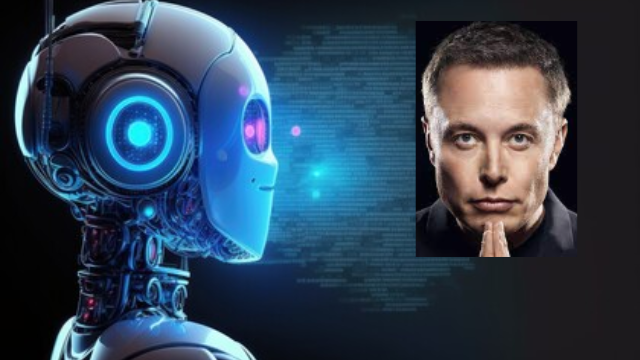Do you ever wonder why Elon Musk, the renowned entrepreneur and visionary, believes that artificial intelligence (AI) poses a significant threat to businesses? In this article, we will delve into Musk’s concerns and explore the potential impact that AI advancements could have on various industries. By examining AI’s ability to outperform humans in critical areas and the risks associated with its integration, we aim to shed light on the implications this technology holds for businesses and the global economy.
Elon Musk’s Concerns About AI Advancements
Elon Musk believes that AI advancements pose a significant threat to businesses. As the CEO of Tesla and SpaceX, Musk is well-versed in technological innovations and their implications. He has expressed concerns about the ethical considerations in AI development, particularly the potential for autonomous systems to make decisions that may not align with human values. Musk fears that without proper regulations and safeguards, AI could be used in ways that harm society or concentrate power in the hands of a few.
To mitigate these risks, Musk has proposed several solutions. First, he advocates for increased transparency in the development of AI systems, emphasizing the importance of understanding how decisions are made. This would allow for better accountability and the identification of potential biases or unintended consequences. Second, Musk has called for the establishment of regulatory bodies to oversee AI development and ensure adherence to ethical standards. These bodies would work in collaboration with industry experts to create guidelines and regulations that balance innovation with societal well-being.
Furthermore, Musk has also emphasized the need for AI developers to prioritize safety. He believes that AI systems should be designed with fail-safe mechanisms and robust testing protocols to minimize the potential for accidents or misuse. By taking proactive measures to address these concerns, Musk hopes to ensure that AI advancements are aligned with human values and do not pose undue risks to businesses or society at large.
Potential Impact of AI on Businesses
The potential impact of AI on businesses is a topic of increasing concern and interest. As AI continues to advance, it has the potential to greatly transform the way businesses operate. Here are three key areas where AI could have a significant impact:
- Efficiency and Productivity: AI has the ability to automate repetitive tasks, allowing businesses to streamline their operations and improve efficiency. By leveraging AI technologies, businesses can optimize processes, reduce errors, and enhance productivity. This can lead to cost savings and increased profitability.
- Job Displacement: While AI can bring efficiency gains, it also raises concerns about job displacement. Many routine tasks that are currently performed by humans could be automated by AI systems. This could lead to a shift in job roles and the need for upskilling or reskilling for employees. Businesses will need to carefully manage this transition and find ways to balance the benefits of AI with the potential impact on their workforce.
- Ethical Considerations: As AI becomes more integrated into businesses, there are ethical considerations that need to be addressed. AI systems are only as good as the data they are trained on, and biases in the data can lead to biased outcomes. Ensuring fairness, transparency, and accountability in AI decision-making processes will be crucial to avoid unintended consequences and maintain public trust.
As businesses embrace AI technologies, it is important to carefully consider these potential impacts and proactively address any challenges that may arise. By doing so, businesses can harness the power of AI to drive innovation, improve operations, and create value while minimizing any negative effects on their workforce and society as a whole.
AI’s Ability to Outperform Humans in Key Areas
Maximizing efficiency and productivity, AI’s ability to outperform humans in key areas poses a significant threat to businesses. One of the primary concerns is AI’s impact on job displacement. As AI technology advances, tasks that were once performed by humans can now be completed more accurately and efficiently by machines. This inevitably leads to a shift in the job market, with certain roles becoming obsolete or significantly reduced in demand.
While AI’s ability to outperform humans may lead to increased productivity, there are ethical considerations in its development that need to be addressed. As AI becomes more sophisticated, it raises questions about the potential for bias and discrimination. If AI algorithms are trained on biased datasets, they can perpetuate existing societal inequalities and reinforce discriminatory practices.
Additionally, AI’s ability to outperform humans in certain areas raises concerns about the potential loss of human expertise. While machines may be able to complete tasks faster and with greater accuracy, they lack the ability to think critically, exercise judgment, and understand complex social dynamics. This highlights the importance of striking a balance between human and machine capabilities, ensuring that AI is used as a tool to augment human intelligence rather than replace it.
Risks and Challenges Associated With AI Integration
As a business owner, you may encounter various risks and challenges when integrating AI into your operations. While AI has the potential to revolutionize industries and improve efficiency, it is essential to consider the ethical implications and potential job displacement that may arise from its integration.
Here are three key risks and challenges associated with AI integration:
- Ethical Considerations: As AI becomes more advanced, it raises important ethical questions. For example, AI algorithms can be biased or discriminatory if they are trained on biased data. Business owners must navigate the ethical considerations surrounding AI, such as privacy concerns, transparency, and accountability for AI decision-making.
- Job Displacement: The integration of AI technologies can lead to job displacement for certain roles that can be automated. While AI can augment human capabilities and create new jobs, it is crucial to consider the impact on employees and communities. Businesses must carefully manage the transition to AI to minimize the negative impact on workers and ensure a smooth transition.
- Technical Challenges: Integrating AI into existing operations can be complex and challenging. It requires significant investment in infrastructure, data collection, and processing capabilities. Additionally, the development and deployment of AI systems require specialized skills and expertise. Business owners need to address technical challenges such as data quality, system integration, and scalability to ensure successful AI integration.
Implications for Industries and Global Economy
When integrating AI into your business, it is important to consider the implications for industries and the global economy. One of the major concerns is job displacement. As AI technology continues to advance, there is a fear that it will replace human workers, leading to unemployment and economic instability. While AI has the potential to automate repetitive and mundane tasks, it is crucial to find ways to reskill and retrain the workforce to adapt to new job roles that AI cannot perform.
Ethical considerations also come into play when integrating AI into industries. As AI becomes more sophisticated, there is a need to establish guidelines and regulations to ensure its responsible and ethical use. Issues such as privacy, bias, and accountability need to be addressed to prevent misuse or discrimination.
The implications of AI on industries and the global economy are far-reaching. On one hand, AI can enhance productivity, improve decision-making, and create new business opportunities. On the other hand, it can disrupt traditional industries, leading to job losses and economic inequality. It is important for businesses and policymakers to carefully navigate these implications to ensure a balanced and inclusive economic growth that benefits all stakeholders.



